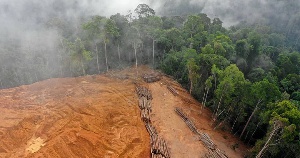The COVID-19 pandemic is the latest crisis facing the world. Unless humans release their grip on nature, it won’t be the last, according to a new report by the United Nations Development Programme (UNDP), which includes a new experimental index on human progress that takes into account countries’ carbon dioxide emissions and material footprint.
The 30th anniversary edition of the Human Development Report, ‘The Next Frontier: Human Development and the Anthropocene’, lays out a stark choice for world leaders – take bold steps to reduce the immense pressure that is being exerted on the environment and the natural world, or humanity’s progress will stall.
“As this report shows, no country in the world has yet achieved very high human development without putting immense strain on the planet. But we could be the first generation to right this wrong. That is the next frontier for human development,” said Achim Steiner, UNDP Administrator.
The report argues that as people and planet enter an entirely new geological epoch, the Anthropocene or the Age of Humans, it is time for all countries to redesign their paths to progress by fully accounting for the dangerous pressures humans put on the planet, and dismantle the gross imbalances of power and opportunity that prevent change.
To illustrate the point, the report introduces an experimental new lens to its annual Human Development Index (HDI). By adjusting the HDI, which measures a nation’s health, education, and standards of living, to include two more elements: a country’s carbon dioxide emissions and its material footprint, the index shows how the global development landscape would change if both the wellbeing of people and also the planet were central to defining humanity’s progress.
With the resulting Planetary-Pressures Adjusted HDI – or PHDI – a new global picture emerges, painting a less rosy but clearer assessment of human progress. For example, more than 50 countries drop out of the very high human development group, reflecting their dependence on fossil fuels and material footprint.
Despite these adjustments, countries like Costa Rica, Moldova, and Panama move upwards by at least 30 places, recognizing that lighter pressure on the planet is possible.
Ghana
Ghana’s HDI value for 2019 is 0.611— which put the country in the medium human development category—positioning it at 138 out of 189 countries and territories. This has improved from a value of 0.465 in 1990, reflecting an increase of 31.4 percent for 2019.
Accounting for planetary pressures: When Ghana’s value is discounted for planetary pressures, the country’s HDI falls from the current 0.611 to 0.601, a loss of 1.6 percent.
The average loss due to planetary pressures for Medium Human Development Index countries to which Ghana belongs is 2.5 percent and for Sub-Saharan Africa, it is 1.5 percent.
Accounting for inequality: The HDI is an average measure of basic human development. Like all averages, the HDI covers inequality in the distribution of human development across the population at the country level.
When discounted for inequality, the HDI for Ghana falls to 0.440, a loss of 28.0 percent. The average loss due to inequality for medium HDI countries is 26.3 percent and for Sub-Saharan Africa it is 30.5 percent.
Accounting for gender-based inequalities: The Human Development Report includes a Gender Inequality Index (GII), which reflects gender-based inequalities in three dimensions – reproductive health, empowerment (measured by the share of parliamentary seats held by women and attainment in secondary and higher education), and economic activity.
Ghana has a GII value of 0.538, ranking it 135 out of 162 countries in the 2019 index. In Ghana, only 13.1 percent of parliamentary seats are held by women, and 55.7 percent of adult women have reached at least a secondary level of education compared to 71.6 percent of their male counterparts.
For every 100,000 live births, 308 women die from pregnancy related causes; and the adolescent birth rate is 66.6 births per 1,000 women of ages 15-19. Female participation in the labour market is 63.6 percent compared to 71.9 for men.
Inequality in health, education and resources for a decent standard of living across the population and between women and men leads to a 30% reduction in human development outcomes. Addressing these gaps and accounting for planetary pressure during the implementation of Ghana’s comprehensive response to COVID-19 would lead to a fairer and more sustainable future for all Ghanaians, Angela Lusigi, Resident Representative of UNDP in Ghana emphasized.
The report shows that inequality, environmental degradation and climate change are tightly interwoven. It identifies three building blocks to create real, lasting change: working with – not against – nature, improving incentives and regulations, and changing social norms.
For instance, the report cites nature-based solutions like reforestation and improved forest management, incentives like investing in renewable energy and implementing the Paris Agreement to accelerate climate action. It also calls for re-orientation of social norms and values to empower people to live and work whiles reducing pressure on the planet.
“By tackling inequality, capitalizing on innovation and working with nature, human development could take a transformational step forward to support societies and the planet together,” said Pedro Conceição, Director of UNDP’s Human Development Report Office and lead author of the report.
Business News of Sunday, 20 December 2020
Source: thebusiness24online.net













